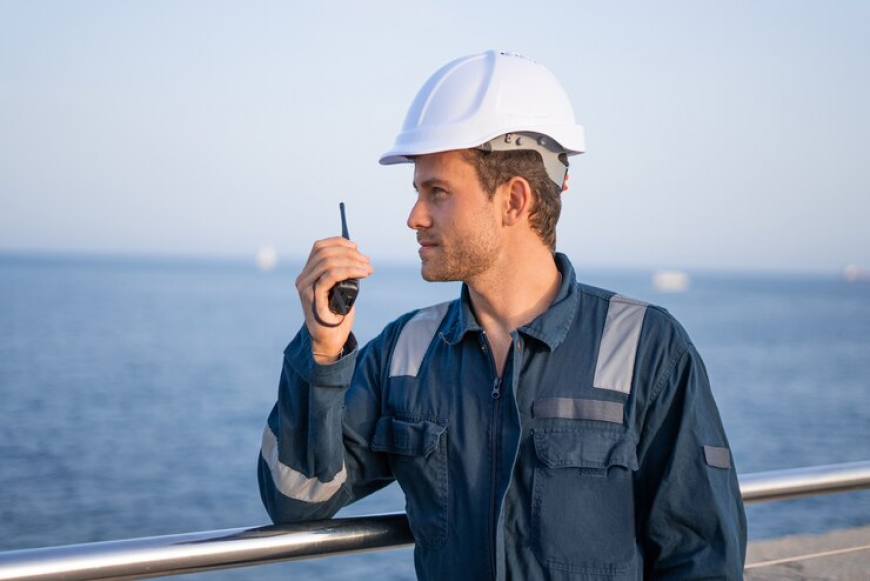Understanding Marine Telephones for Secure Sea Communication
A marine telephone is a vital tool for any vessel operating in UAE waters

Reliable communication is vital for marine operations. Whether you're navigating commercial shipping lanes or managing private vessels, a marine telephone serves as a crucial link between the sea and shore. In the UAE, with its growing maritime industry, ports, and offshore developments, understanding marine telephone systems is essential for safety, compliance, and operational efficiency.
What is a Marine Telephone?
A marine telephone is a specialized communication device used aboard ships and boats. It facilitates voice communication between vessels, coastal stations, and maritime authorities. These systems operate on designated marine frequency bands to ensure uninterrupted and secure communication at sea.
Marine telephones are designed to withstand harsh marine environments, including high humidity, salt corrosion, and rough handling.
Why Marine Telephones are Important in the UAE
The UAE has one of the busiest maritime zones in the Middle East. Ports like Jebel Ali, Port Rashid, and Khor Fakkan handle vast volumes of cargo and vessels daily. Here's why marine communication is critical in these waters:
-
Safety: Enables vessels to call for help during emergencies or adverse weather.
-
Navigation: Helps in receiving port instructions, weather updates, and navigation alerts.
-
Coordination: Assists in communication between different crew members and external agencies.
-
Compliance: Ensures adherence to UAE maritime laws and international marine communication protocols.
Key Features of a Marine Telephone
Marine telephones differ from standard telephones due to the following features:
-
Water and Dust Resistance: Designed to function in wet and dusty environments.
-
Long-Range Communication: Capable of communicating across vast distances at sea.
-
VHF and HF Support: Supports both Very High Frequency (VHF) and High Frequency (HF) for different communication needs.
-
Intercom Functionality: Allows internal communication across different parts of the vessel.
-
Distress Calling: Includes an emergency button for distress signals (e.g., DSC - Digital Selective Calling).
Types of Marine Telephones
There are several types of marine communication systems available in the UAE, each serving different purposes:
1. VHF Marine Radios
-
Most common type of marine telephone
-
Used for short-range ship-to-ship or ship-to-shore communication
-
Operates on internationally recognized marine VHF channels
2. MF/HF Marine Radios
-
Ideal for long-range communication
-
Commonly used for international voyages
-
Supports voice and digital communication
3. Satellite Phones
-
Provides global coverage, even beyond radio range
-
Useful for offshore vessels, oil rigs, and yachts operating far from the coast
4. Intercom Systems
-
Internal communication system for large ships
-
Useful for coordination between bridge, engine room, and decks
Usage Guidelines in UAE Waters
Operating a marine telephone in the UAE involves following specific guidelines and regulations:
-
Licensing: Vessels must obtain a radio license from the UAE Telecommunications and Digital Government Regulatory Authority (TDRA).
-
Training: Operators should be trained and certified in marine communication, such as GMDSS (Global Maritime Distress and Safety System) protocols.
-
Equipment Standards: Devices must comply with IMO (International Maritime Organization) and UAE maritime safety standards.
-
Regular Maintenance: Marine phones should undergo routine checks to ensure signal clarity and system reliability.
Common Use Cases in the UAE
Marine telephones are widely used across various sectors in the UAE:
● Commercial Shipping
Vessels carrying cargo rely on marine telephones for port instructions, navigation assistance, and customs coordination.
● Offshore Operations
Oil and gas platforms in the Persian Gulf use satellite-based systems for uninterrupted communication with onshore offices and supply ships.
● Recreational Boating
Yachts and leisure boats use VHF radios for weather updates, marina coordination, and emergency contact.
● Coast Guard and Maritime Security
Marine telephones support patrolling, surveillance, and emergency response by maritime security agencies.
Advantages of Using Marine Telephone Systems
-
Enhanced Safety: Immediate access to help during emergencies.
-
Operational Efficiency: Smooth coordination with ports, crew, and support teams.
-
Global Communication: Satellite phones allow worldwide reach.
-
Compliance: Ensures your vessel adheres to UAE maritime law.
Challenges in Marine Communication
While marine telephone systems are effective, they also come with a few challenges:
-
Signal Interference: High vessel traffic can cause channel congestion.
-
Cost: High-end systems, especially satellite phones, can be expensive.
-
Maintenance: Exposure to saltwater requires frequent servicing.
Addressing these challenges with regular training and quality equipment is key to smooth operations.
Choosing the Right Marine Telephone in the UAE
Before selecting a system, consider:
-
Vessel Type and Size: Large commercial vessels need advanced systems; smaller boats may only need basic VHF units.
-
Range of Operation: For short trips near the coast, VHF radios work. For deep-sea operations, choose HF or satellite options.
-
Regulatory Compliance: Ensure the system meets UAE licensing and safety requirements.
Maintaining Your Marine Telephone System
Routine checks and servicing ensure performance and durability:
-
Inspect cables and connectors for corrosion
-
Test battery backup systems
-
Clean equipment regularly
-
Update software and firmware if applicable
Future of Marine Communication in the UAE
With the UAE's ongoing focus on smart ports and digital transformation, marine communication is evolving:
-
Integration with AIS (Automatic Identification System)
-
Use of IoT for real-time data transmission
-
Enhanced security features to prevent unauthorized access
The future of marine telephony lies in combining robust hardware with smart digital systems.
Conclusion
A marine telephone is a vital tool for any vessel operating in UAE waters. From cargo ships to private yachts, every sea-going entity benefits from reliable and regulated marine communication. Understanding the types, features, and usage of marine telephone systems ensures safety, efficiency, and legal compliance.

 danieljack
danieljack